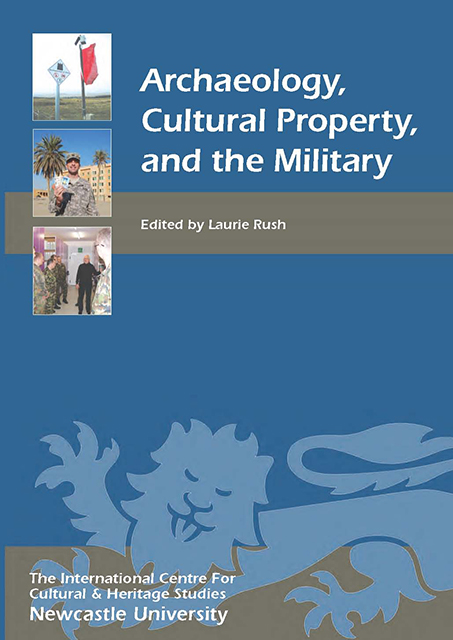Book contents
- Frontmatter
- Contents
- List of Illustrations: Figures and Tables
- Archaeology and the Military: An Introduction
- 1 The Obligations Contained in International Treaties of Armed Forces to Protect Cultural Heritage in Times of Armed Conflict
- 2 Rescuing Europe’s Cultural Heritage: The Role of the Allied Monuments Officers in World War II
- 3 The UK’s Training and Awareness Programme
- 4 US Army Civil Affairs: Protecting Cultural Property, Past and Future
- 5 Cultural Property Protection in the Event of Armed Conflict: Deploying Military Experts or Can White Men Sing the Blues?
- 6 Good Training and Good Practice: Protection of the Cultural Heritage on the UK Defence Training Estate
- 7 In-Theatre Soldier Training through Cultural Heritage Playing Cards: A US Department of Defense Example
- 8 Dealing the Heritage Hand: Establishing a United States Department of Defense Cultural Property Protection Program for Global Operations
- 9 Teaching Cultural Property Protection in the Middle East: The Central Command Historical/Cultural Advisory Group and International Efforts
- 10 Cultural Resources Data for Heritage Protection in Contingency Operations
- 11 Time not on my Side: Cultural Resource Management in Kirkuk, Iraq
- 12 US Military Support of Cultural Heritage Awareness and Preservation in Post-Conflict Iraq
- 13 Operation Heritage
- 14 Cultural Property Protection in the Event of Armed Conflict – Austrian Experiences
- 15 The Role of the Swiss Armed Forces in the Protection of Cultural Property
- 16 Preserving Global Heritage from Space in Times of War
- Appendix 1 1954 Hague Convention and its two Protocols
- Appendix 2 Author Biographies
- Index
9 - Teaching Cultural Property Protection in the Middle East: The Central Command Historical/Cultural Advisory Group and International Efforts
Published online by Cambridge University Press: 28 February 2023
- Frontmatter
- Contents
- List of Illustrations: Figures and Tables
- Archaeology and the Military: An Introduction
- 1 The Obligations Contained in International Treaties of Armed Forces to Protect Cultural Heritage in Times of Armed Conflict
- 2 Rescuing Europe’s Cultural Heritage: The Role of the Allied Monuments Officers in World War II
- 3 The UK’s Training and Awareness Programme
- 4 US Army Civil Affairs: Protecting Cultural Property, Past and Future
- 5 Cultural Property Protection in the Event of Armed Conflict: Deploying Military Experts or Can White Men Sing the Blues?
- 6 Good Training and Good Practice: Protection of the Cultural Heritage on the UK Defence Training Estate
- 7 In-Theatre Soldier Training through Cultural Heritage Playing Cards: A US Department of Defense Example
- 8 Dealing the Heritage Hand: Establishing a United States Department of Defense Cultural Property Protection Program for Global Operations
- 9 Teaching Cultural Property Protection in the Middle East: The Central Command Historical/Cultural Advisory Group and International Efforts
- 10 Cultural Resources Data for Heritage Protection in Contingency Operations
- 11 Time not on my Side: Cultural Resource Management in Kirkuk, Iraq
- 12 US Military Support of Cultural Heritage Awareness and Preservation in Post-Conflict Iraq
- 13 Operation Heritage
- 14 Cultural Property Protection in the Event of Armed Conflict – Austrian Experiences
- 15 The Role of the Swiss Armed Forces in the Protection of Cultural Property
- 16 Preserving Global Heritage from Space in Times of War
- Appendix 1 1954 Hague Convention and its two Protocols
- Appendix 2 Author Biographies
- Index
Summary
Arelatively well-known business training video used in the US portrays a very eager team attempting to construct an aeroplane in flight. The narrator discusses quality control as workers attempt to construct a cabin around wind-blown passengers. The metaphor applies to a host of government and business undertakings and, to be perfectly honest, it also applies to aspects of US military attempts to develop a heritage training and planning programme1 concurrently with US forces being actively engaged in some of the most archaeologically rich areas of the world. As the US Central Command (CENTCOM) Historical Cultural Advisory Group (CCHCAG or CENTCOM HCAG) begins to plan and implement training for cultural property protection, deployed personnel approach members of the group with on-theground and immediate archaeological and heritage landscape challenges. As the US pursues full spectrum operations in Iraq and Afghanistan, the immediate archaeological issues can range from soldiers taking a pot shot at an archaeological site surveillance tower to inadvertent destruction of an ancient Afghan water system, affecting multiple villages. All of the advisory group members recognise that both the immediate needs and the long-term goals are critical. Forward personnel require and deserve all of the reach-back expertise they request. However, establishment within the United States Department of Defense of a permanent cultural property programme that provides maps, information, education, training and guidelines for behaviour should dramatically decrease the number of heritage challenges that are encountered unexpectedly.
THE ADVISORY GROUP
The CENTCOM HCAG began when military archaeologists came together for the first time at the Archaeological Institute of America (AIA) Annual Meeting in Chicago in January 2008. In this setting, professional archaeologists had the opportunity to meet with Department of Defense (DoD) personnel to articulate their concerns and suggest solutions. Group members now include the lead environmental officer for CENTCOM, the Deputy Federal Historic Preservation Officer for the DoD, environmental officers and GIS professionals for Army and Air Force Central Commands, the Air Combat Command Cultural Resources Manager, the Deputy Preservation Officer for the Air Force, the Director of the Legacy In-Theater Heritage Training Program, the Director of Cultural Resources for Colorado State University Center for Environmental Management of Military Lands, the Cultural Heritage Liaison for the US Embassy in Baghdad, and a professional archaeologist who served as a volunteer Cultural Resources Manager while serving as an airman in Kirkuk.
- Type
- Chapter
- Information
- Archaeology, Cultural Property, and the Military , pp. 98 - 107Publisher: Boydell & BrewerPrint publication year: 2010



